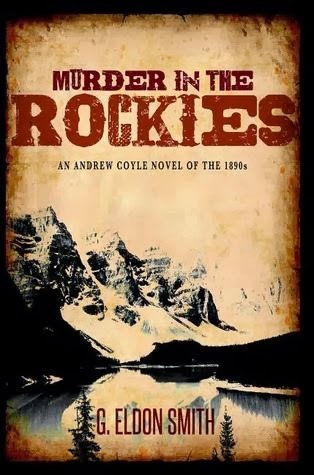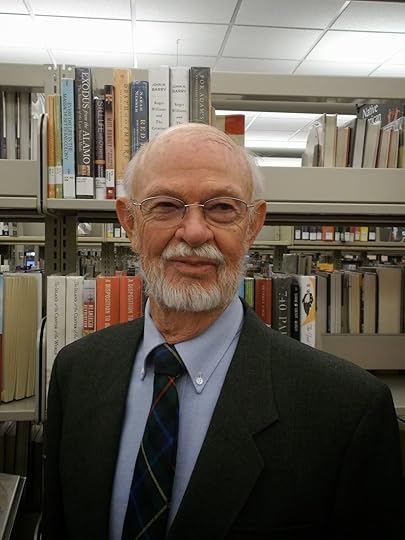Author Interview with G. Eldon Smith
Name: G. Eldon Smith Author of: Murder in the Rockies*Interviewer comments are in bold.

 1. What inspired you to write your first book? First, I would like thank you for this interview and an opportunity to communicate with readers of your blog.
1. What inspired you to write your first book? First, I would like thank you for this interview and an opportunity to communicate with readers of your blog.
Years ago, I wrote short story about three siblings and their bikes and a tricycle. That sold to a Sunday school magazine that I don’t even remember the name of today. But the itch was still there to write a real novel. In answer to your question, the computer with Word and the ability to go back and make changes without using ez erase typing paper, it was the computer that inspired me to write my first novel. 2. How did you come up the Ideas for your book?When I was a youngster, my father and uncle read westerns, Max Brand, Luke Short, etc. and traded them back and forth. As a grown up, I thought I would write a western, because that is what I had seen at home. I also liked the courtroom drama genre because they have a definite ending…the accused is either found innocent or guilty. Aha, a cowboy western lawyer.
The more research I did, the more often the year 1890 came up. Old photos were dated 1890. The cornerstone of the Colorado State Capitol Building was laid in 1890. I had no choice; the novel had to be set in 1890. Denver was not a cowboy town any longer. With a population of over 100,000, Denver was an urban center in those days. Thus the situation presented itself. Denver in 1890 was not really my idea at all.3. What genre do you consider your book(s)? Murder in the Rockies is a historical mystery. It is definitely not a western, any more than Sherlock Holmes is about knights in armor. 4. Are experiences based on someone you know, or events in your own life? Many of the characters are composites of people I’ve known. Or to be honest, characters I’ve seen in movies and on TV. The characters’ experiences and reactions to those experiences needed to been seen through 1890 eyes. As a youth, I observed my grandparents generation. What I learned, without knowing it, was the basis of most of the dialog, expressions, and attitudes demonstrated in the book.
I wrote the beginning and the ending. I knew what was done and who-dun-it, but the characters wrote the plot. Some characters that entered the story were completely unplanned. I simply operated Spell Check and the rest wrote itself. I never outline.
I understand both of the sentiments here. I often get character inspiration from actors, though not always when they are filling a role dictated by a script. I have talked about this in an earlier post. Characters are very much the driving force behind my plot, there are things that they would never do or say and to write them going against their nature feels very wrong. I also find that certain aspects of characters are very tiny parts of me, just magnified to a greater degree. 5. What book are you reading now?I just finished Fallen Women by Sandra Dallas. She is a remarkable author who deserves the vast audience she has accumulated over the years and her best selling novels. I met Dallas at one of her book signings, and found her to be a very gracious and charming lady.
Fallen Women is also set Denver and the year is 1885. Much of Dallas’ research overlapped with my mine. Fallen Women and Murder in the Rockies are both mysteries with the same time and place settings and they present many of the same historical facts. Yet they are two completely different stories. We put emphasis on different aspects of the same era.6. If you had to do it all over again, would you change anything in your latest book? Every once in a while I think of a sentence that could have been worded differently. I tell myself that I have to let it go, and move on to the next project.7. Is there anything you find particularly challenging in your writing? The most challenging thing is to keep in mind that the setting was 1890 and modes of transportation were different, slang was different, and technology was different. I try to keep everything authentic, and sometimes that is hard.
I based some key parts of solving the mystery on the many innovations that were introduced in the late nineteenth century. The people of that era were just as overwhelmed and amazed by the inventions of that day as we are with today’s constantly changing technology. 8. Did you learn anything from writing your book and what was it? I learned a great deal about Colorado history. You will find historical facts sprinkled throughout the mystery and mayhem of Murder in the Rockies. I also use bits of information in my blog, Thoughts and Opinions, in a section called “Bet You Didn’t Know.”
The section reminds me of a local radio stations "Don'tch Know" contest. Try saying that in a bad Minnesotan accent. The radio hosts will ask a question (mostly random trivia) and the call has to say, "don'tch know it's ______," to win. 9. Do you have any advice for other writers? As a novice author myself, I am in more of a position to ask for advice than give it. If you are fortunate enough to get advice or suggestions from experienced, writers, editors, or publishers, listen to them, and be willing to change.
G. Eldon Smith can be found on his webpage at http://garyesmith-author.net/index.html and on Goodreads at https://www.goodreads.com/author/show/7237054.G_Eldon_Smith
His book is available on Amazon at http://amzn.com/1938467701

 1. What inspired you to write your first book? First, I would like thank you for this interview and an opportunity to communicate with readers of your blog.
1. What inspired you to write your first book? First, I would like thank you for this interview and an opportunity to communicate with readers of your blog.Years ago, I wrote short story about three siblings and their bikes and a tricycle. That sold to a Sunday school magazine that I don’t even remember the name of today. But the itch was still there to write a real novel. In answer to your question, the computer with Word and the ability to go back and make changes without using ez erase typing paper, it was the computer that inspired me to write my first novel. 2. How did you come up the Ideas for your book?When I was a youngster, my father and uncle read westerns, Max Brand, Luke Short, etc. and traded them back and forth. As a grown up, I thought I would write a western, because that is what I had seen at home. I also liked the courtroom drama genre because they have a definite ending…the accused is either found innocent or guilty. Aha, a cowboy western lawyer.
The more research I did, the more often the year 1890 came up. Old photos were dated 1890. The cornerstone of the Colorado State Capitol Building was laid in 1890. I had no choice; the novel had to be set in 1890. Denver was not a cowboy town any longer. With a population of over 100,000, Denver was an urban center in those days. Thus the situation presented itself. Denver in 1890 was not really my idea at all.3. What genre do you consider your book(s)? Murder in the Rockies is a historical mystery. It is definitely not a western, any more than Sherlock Holmes is about knights in armor. 4. Are experiences based on someone you know, or events in your own life? Many of the characters are composites of people I’ve known. Or to be honest, characters I’ve seen in movies and on TV. The characters’ experiences and reactions to those experiences needed to been seen through 1890 eyes. As a youth, I observed my grandparents generation. What I learned, without knowing it, was the basis of most of the dialog, expressions, and attitudes demonstrated in the book.
I wrote the beginning and the ending. I knew what was done and who-dun-it, but the characters wrote the plot. Some characters that entered the story were completely unplanned. I simply operated Spell Check and the rest wrote itself. I never outline.
I understand both of the sentiments here. I often get character inspiration from actors, though not always when they are filling a role dictated by a script. I have talked about this in an earlier post. Characters are very much the driving force behind my plot, there are things that they would never do or say and to write them going against their nature feels very wrong. I also find that certain aspects of characters are very tiny parts of me, just magnified to a greater degree. 5. What book are you reading now?I just finished Fallen Women by Sandra Dallas. She is a remarkable author who deserves the vast audience she has accumulated over the years and her best selling novels. I met Dallas at one of her book signings, and found her to be a very gracious and charming lady.
Fallen Women is also set Denver and the year is 1885. Much of Dallas’ research overlapped with my mine. Fallen Women and Murder in the Rockies are both mysteries with the same time and place settings and they present many of the same historical facts. Yet they are two completely different stories. We put emphasis on different aspects of the same era.6. If you had to do it all over again, would you change anything in your latest book? Every once in a while I think of a sentence that could have been worded differently. I tell myself that I have to let it go, and move on to the next project.7. Is there anything you find particularly challenging in your writing? The most challenging thing is to keep in mind that the setting was 1890 and modes of transportation were different, slang was different, and technology was different. I try to keep everything authentic, and sometimes that is hard.
I based some key parts of solving the mystery on the many innovations that were introduced in the late nineteenth century. The people of that era were just as overwhelmed and amazed by the inventions of that day as we are with today’s constantly changing technology. 8. Did you learn anything from writing your book and what was it? I learned a great deal about Colorado history. You will find historical facts sprinkled throughout the mystery and mayhem of Murder in the Rockies. I also use bits of information in my blog, Thoughts and Opinions, in a section called “Bet You Didn’t Know.”
The section reminds me of a local radio stations "Don'tch Know" contest. Try saying that in a bad Minnesotan accent. The radio hosts will ask a question (mostly random trivia) and the call has to say, "don'tch know it's ______," to win. 9. Do you have any advice for other writers? As a novice author myself, I am in more of a position to ask for advice than give it. If you are fortunate enough to get advice or suggestions from experienced, writers, editors, or publishers, listen to them, and be willing to change.
G. Eldon Smith can be found on his webpage at http://garyesmith-author.net/index.html and on Goodreads at https://www.goodreads.com/author/show/7237054.G_Eldon_Smith
His book is available on Amazon at http://amzn.com/1938467701
Published on December 04, 2013 13:31
No comments have been added yet.
Rach's Blog
- Rach's profile
- 137 followers
Rach isn't a Goodreads Author
(yet),
but they
do have a blog,
so here are some recent posts imported from
their feed.



